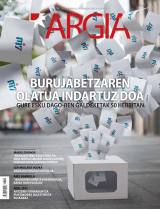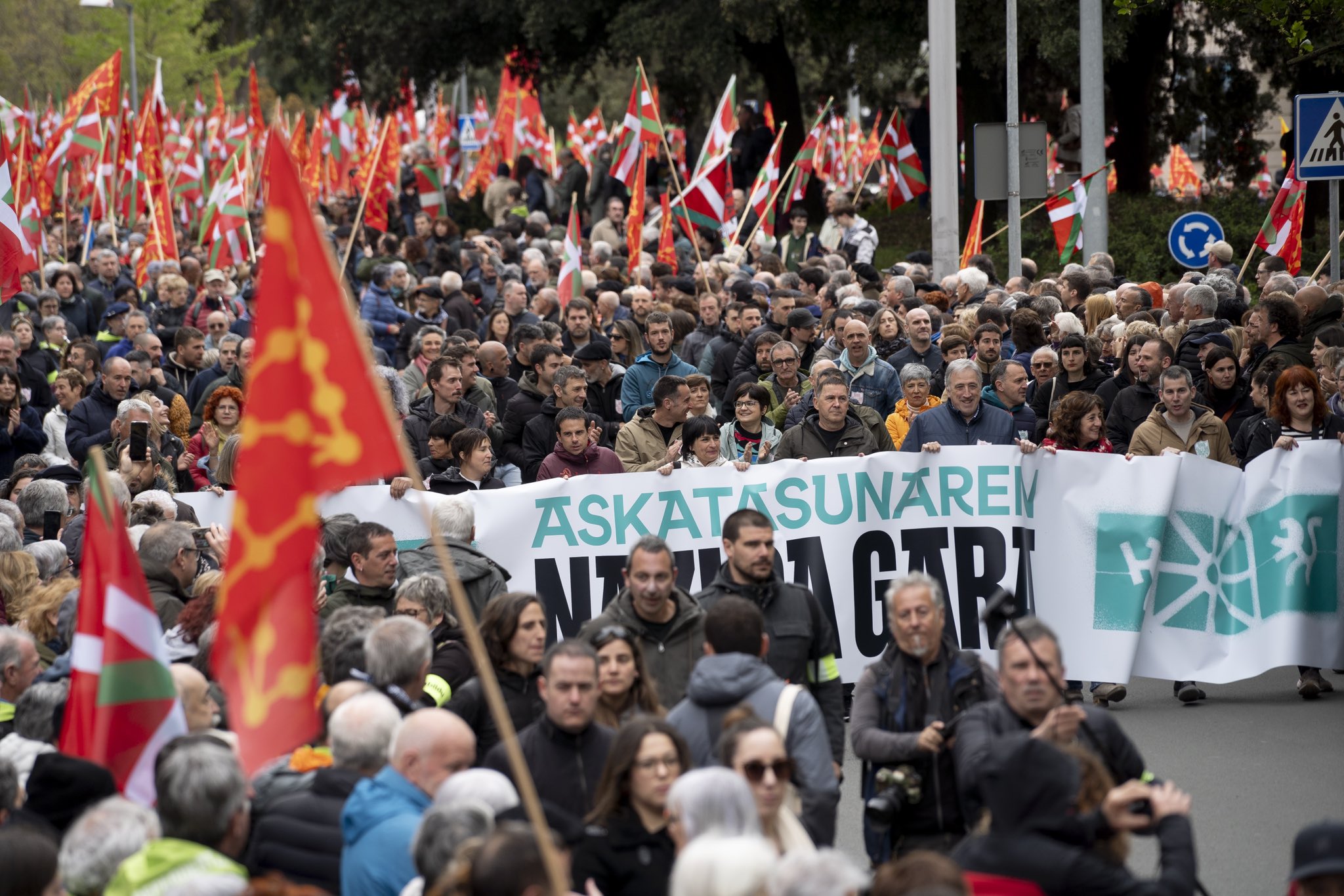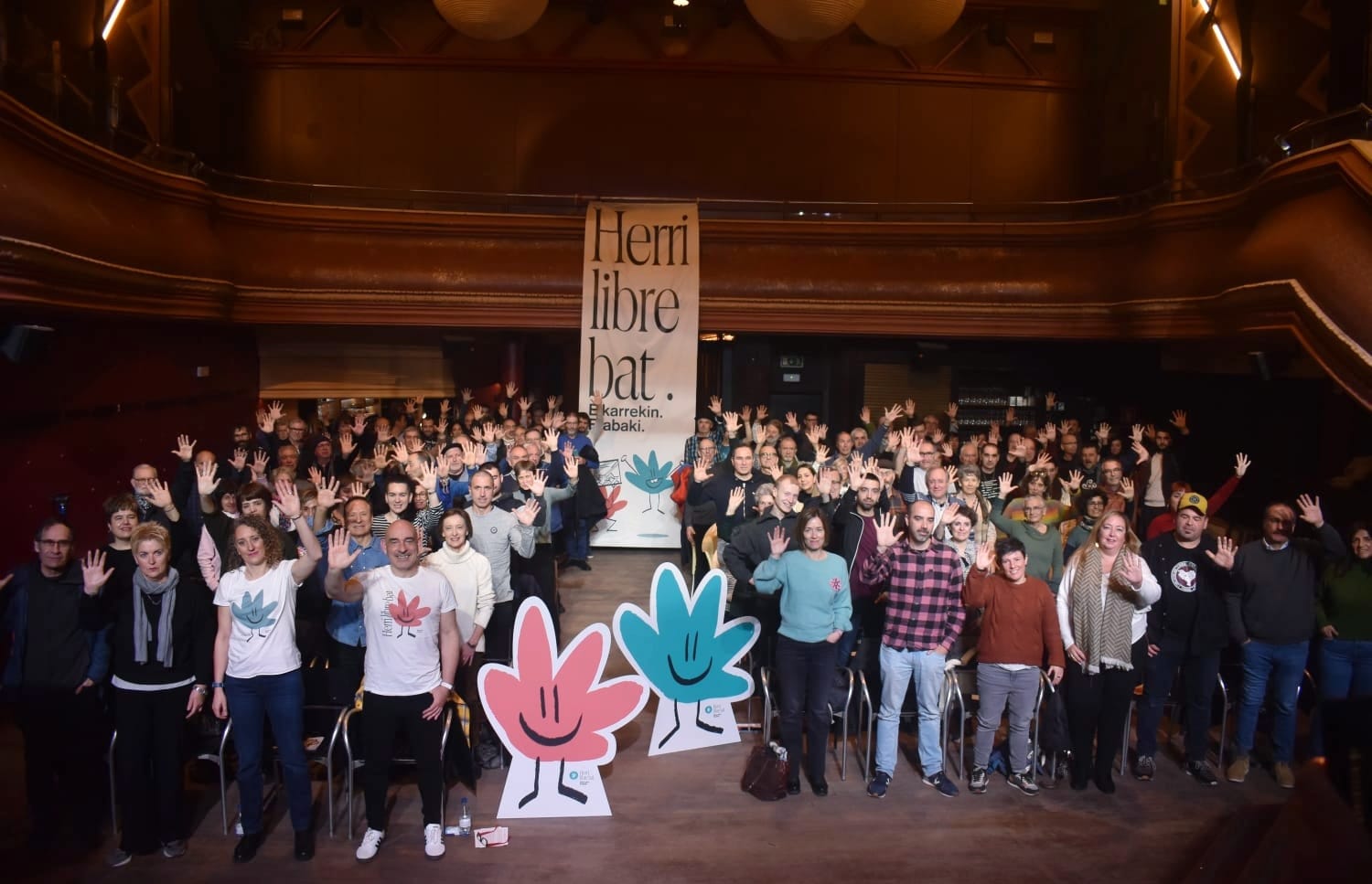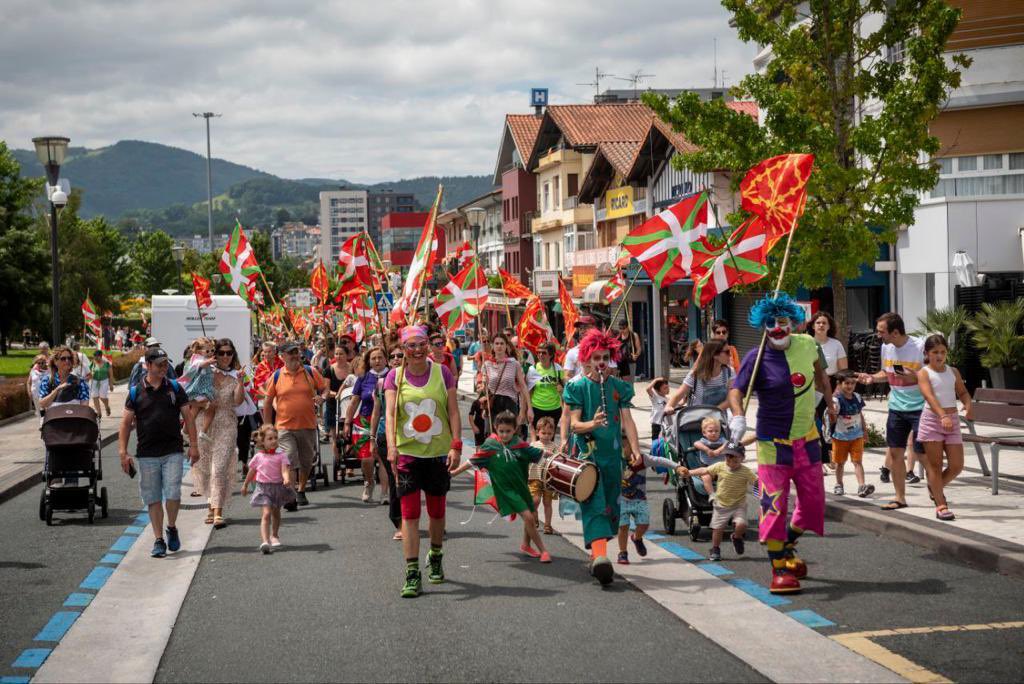"The accumulation of forces for social sovereignty and Šesku dago are not contradictory"
- Mario Zubiaga is a professor at the UPV/EHU, specializing in issues related to Basque nationalism and the right to decide. At the same time, it belongs to the secretariat of Šesku Dago. At a time when Basque society is experiencing such an important moment around the right to decide, its view is particularly interesting.
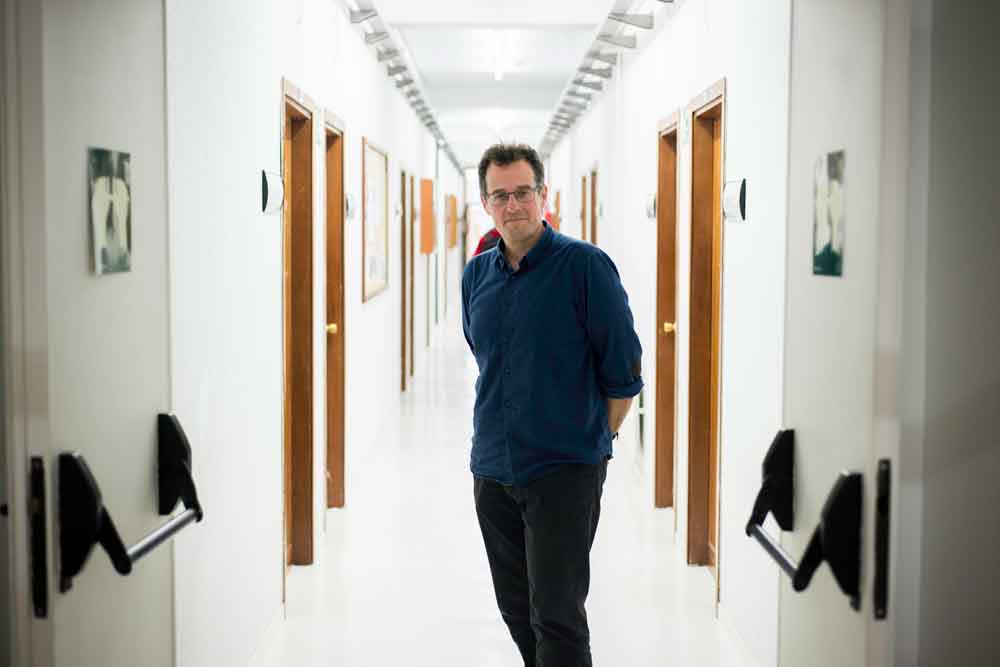
How do you assess the results of the consultations held so far in the municipalities?
In such questionnaires it is very easy to use the framework for participation of any other questionnaire, and we find it very difficult to get out of it. For example, the media insists that participation in these consultations is being low. It is also difficult for the members of the towns of Šesku Dago to get out of that fact of participation, 22%, 25%, 27%… and then, in many villages, there is despair: “Only 25%?” That is why, first of all, I would value qualitative change: What progress has been made in reaching the consultation? What does that mean for the people? To what extent have the citizens of a people with a sovereign vision come together? With what degree of transversality?
In the consultations promoted by Qatar Esku Dago, this transversality is being very important in all peoples. There is also mediation work, which leads to the mobilisation of demobilized and disconnected sectors and to very concrete action, that is, in a consultation, a stranger – who is not official – gives you your data and tell us what you want.
Is it a measure of the qualitative aspect to see lehendakari Ardanza go to vote?
Yes, it can be. See Esku Dago is working hard to get all parties to decide on the right to decide. In the case of the PNV, have intervened, among others, Xabier Barandiaran, Elixabete Piñol, Iñigo Iturrate, Josune Gorospe… But, without a doubt, the presidents have a special framework: The vote by José Antonio Ardanza and, above all, the permanent commitment of Juan José Ibarretxe to the right to decide.
What assessment does it make on the quantitative aspect?
Achieving the participation of 25% to 30% of the census from a popular initiative is a success. Anyone who knows about these things knows that. The City of Madrid organises a consultation of this kind and does not reach 5%. The Seville City Council convenes a popular consultation to know if the Seville Fair is to be extended and does not reach 6% of the visitors. Despite putting the entire instrumentation of a state at the service of a consultation, it is barely over 50%. In Catalonia, the Statute now in force had a participation of 48%.
Let's take a concrete example, Tolosa. In the last municipal elections there was a great struggle between EH Bildu and the PNV, and the vote was also sought in the last corners of the territory: The number of votes cast was 9,000. Now half has been achieved in the Tours Esku Dago group where 10 people work. It's great!

In the article Shared exception – Shared exception – that you have written, you ask the following question at the beginning: “Are we in a constituent moment or do we have to start accumulating forces and wait for better times?” Where are we?
That is the question I ask the political actors who want to bring a new political status. I feel that parties and unions with a sovereign vision believe that it is not yet the time to start the sovereign machine. The Abertzale left is still closing the previous cycle and, among other things, is carrying out an internal reorganization in which the Abertzale left is supported. In the PNV, there are surely doubts when it comes to dealing with this bottleneck: Is it the time for the sovereign leap? Are we going to put at risk what we have to achieve a higher level of self-government? In general, they look at what happens in Catalonia, and then they look at what happens in the future.
At the same time, however, there are those who believe that the maintenance of what is there does not guarantee the minimum development of self-government.
These views are either not seen or stored.
If at the moment the PNV says it wants an eight-track circus, the state will give it the "yes". And to say that that is not hard for the nationalist thinking that has so far dominated. The key to the State is always the same – divide and rule – and in this case not only feeds the division between Abertzales, but also between Catalonia and Euskal Herria. And the alternative to those gifts that you're receiving in exchange for submission, at the moment, is nothing more than projects and hypotheses, without material ingredients. However, within the PNV, they are aware that only the right to decide can guarantee the future self-government and that, therefore, a project such as Dena Esku Dago is essential: “Yes, the train is fine, but people also ask for the right to decide.”
How do you see the involvement of sovereign forces with the right to decide?
Ever since it started with the questionnaires, Locks Esku Dago is slowly coming in with a new force on the agenda. It is no longer just a coexistence linked to the human chain, working together, creating a good atmosphere in society, joyful… The sovereign forces have already warned that Qatar Esku Dago has a roadmap and that, as in Catalonia, there is a will to make an agenda with our political leaders. Over 100,000 people have already said they want to decide as a people. It seems that GED’s intention is to continue strengthening this democratic mandate, both through consultations and from June through the Citizens’ Pact.
Over the next two years, the Basque Parliament's Self-Government Report has to lay down a basis on which a proposal for a new statute could be drawn up. If nothing is done, what comes out there will only be the result of relations between parliamentary forces, and the relationship of forces in favour of the right to decide in the current Basque Parliament is not very clear. With the PSE and Podemos it can be easy to establish vague bases that do not link too much, and that the articulated text is an articulated text that Madrid can approve. Some will never repeat the trajectory of Ibarretxe, and if they travel to Madrid they will do so with a text that allows them to accept it. If there is no pressure from the public, this is the most logical scenario. That is why, surely, this is the time to put the right to decide on the agenda, so that it appears in a way to exercise it in the articulated text. The pressure of the citizens that drives Locks Esku Dago at the moment is linked to it.

Are the new build-up of forces for social sovereignty proposed by ELA and the current dynamic of Ensure Esku Dago in contrast?
I don't think so. Some consider opposites and think that Locks Esku Dago has very basic, too diffuse approaches. I do not think that is the case. On the one hand, Ns Esku Dago asserts the right to decide and demands concrete tools to make it a reality. On the other hand, the right to decide is not limited to a single area, but has a profound philosophy, a cry of citizen sovereignty. That’s why I would say that the social message that people have in Ns Esku Dago and the social message that ALS or other agents advocate are not contradictory. What is the natural instrument to be sovereign? To be a state. What do we want to be sovereign for? To have a good life, well-being, social justice... comes one after the other. And in that succession, what is the contribution of Zion Esku Dago? That it is in the hands of the Basque people to take steps freely along that path, without limits. This claim does not seem to me to be anything innocent.
In this respect, I do not believe that there is a need for new actors. When the paradigm shift aims at accumulating forces, do we think that a more radical discourse will attract more people? At this historic moment, it is not a question of creating a minimum of vanguard, a clear independence, an alternative social discourse, that works the counterpart... this moment is that of the accumulation of forces. Is a clear independent agent, such as the ANC – the Catalan National Assembly – suitable for this accumulation of forces, leaving out non-nationalist sovereigns? Or, from another point of view, is it appropriate to have an agent based solely on the discourse of the trade unionist majority that leaves on the way more “centrist” sovereigns? It is not possible to predict the evolution of a powerful sovereign instrument that departs from society, because it is in the hands of the participants, but it is clear that an initiative such as Qatar Dago may be more appropriate for the dissemination of the message and the consolidation of majorities. After all, if a particular political party or trade union calls on the citizens to meet, that creates barriers in itself.
Joxe Elorrieta, in his last book, says that it is impossible to make a sovereign process without putting neoliberalism at the center of the debate.
There are many ways to put neoliberalism at the centre, one of them is to pedagogy against neoliberalism, and not with classical and highly ideological speeches. The elite that drives our society is neoliberal, but I don't think the majority of our society is neoliberal, and you have to look for a speech to attract that majority. What is that discourse that will allow the accumulation of forces? A harsh and classic discourse or a more diffuse discourse against neoliberalism, but which in the end will also be against neoliberalism? This hardest speech can be made in their day to day by the unions, the parties… each in their field, but the right to decide, in its depth, is the most effective discourse to deal with neoliberalism.
Are there many conflicting issues in the villages, such as the Zubieta incinerator in Gipuzkoa, or social justice, the Income Guarantee Income… that should be omitted by the members of Inca Esku Dago?
A framework is set out in the core document of Šesku Dago, “Eskura”, and in the Citizens’ Pact that is now being launched, which makes it very clear what the objectives are: that we want to decide on all things. This general framework is valid for everyone and allows everyone to develop their own platform. On 10 June, the presentation of the Citizens' Pact will take place, in which this development of content can be made very spectacularly: for example, trade unions can meet a week earlier – to say something – and say why they support the pact, referring to all their speech. The same applies to students, jurists, cultural agents or other sectors: the pact offers a framework – the demand for the right to decide and the need for instruments to exercise it – and then each one builds its own platform. Around 2,000 members of Esku Dago have groups in many villages, a few bonds have been built… that is worth not leaving aside a trust and the possibility of an evolution that can be filled with content.

Many see even the attempt to rebuild the spirit of Maltzaga.
This has nothing to do with Maltzaga. This is the elites' process: pick up, negotiate, reach consensus, and then tell people. The same thing happened in Lizarra-Garazi, where the elites agreed and people watched. See Esku Dago is a movement that claims the right of citizens to decide their political status, and in this sense we could understand it as a broad sovereign initiative, an open initiative that is being built from the bottom up and that is being filled with content. Social growth, like many others, is there and those contents will be developed according to the involvement of each Esku Dago, are not predetermined. See Esku Dago does not want to create a new trench in society, but a sweet place to work together and together on the road to achieving the decisions of Basque citizenship. To the extent that Tours Esku Dago feeds on, the decisive and participatory culture feeds on and that implies the empowerment of people. In this way, political identities are built and rebuilt, as Catalonia has shown.
The polls have brought great social mobilization, but there is no tension. Can we make a sovereign process without tension?
This is a dynamic process. See Esku Dago of the human chain, of the consultations and what may come are the same, and at the same time different. It is not possible to say in advance what the direction will be, because it is in the hands of the citizens who participate in the dynamic: some may be more at ease in this initial scheme, others advocate for a clearer political direction and others will think that their natural evolution is the creation of a Catalan National Assembly. It is clear that from the human chain CincEsku Dago has more political presence, but without tension yet, because tension is ignited when a position of strength is achieved, in competition with those who do not respect the will of the citizens.
Getting the institutions involved is also one of the goals of Céesku dago. To what extent do you think you are getting it?
The consultations are taking steps and the pictures of all or most of the councillors in favour of the consultations are being repeated in the municipalities. From June onwards, the Citizens' Pact will develop between actors and institutions. From there you will see what strength is accumulating, sometimes, to our institutions in order to be able to say to the Basque Parliament “must receive this popular request and guarantee the way to carry out the decision”.
After the consultations, the Pact...?
The final objective of the Šesku Dago roadmap is, of course, to materialise the decision of the citizens, but the tool for this is increasingly defining the popular dynamic itself. We must not forget that there are other open lanes which, in theory, should have the same destination. For example, will the Basque Parliament’s paper have an empowering consultation? In other words, when the text is adopted, then you have to go to Madrid. Perhaps we should go with a prior consultation, although this is not provided for in the law. Perhaps, whether authorized or overcome the ban, there is a possibility that such an empowering consultation will take place at the end of 2018 or the beginning of 2019. Social initiative can be decisive at that time. This is how it was in Catalonia on November 9.
There are, therefore, some signs that point forward.
We do not know what will come out of the report, but it is clear that, in line with what we have learned from Catalonia, what is done is that what is done is done jointly, institutions, parties, social agents, citizenship in common…

Here there is also something similar to En Común in Catalonia: steps have been taken in theory in favor of the right to decide. And in practice?
In part, here too is what happens in Catalonia. In this policy area there are various models for the modification of the structures of the State. This political space comes from different places and with different perspectives. There are those who think that social mobilization is essential to achieve the right to decide, others who first need an agreement with the State and for that reason do not see mobilisation as important, and others who say that a prior referendum, albeit unilateral, is perhaps interesting in order to reach an agreement. Today everyone is in favour of the right to decide. When the time comes to decide, doubts arise. The debate is now focusing on En Comú de Catalunya, which is approaching the turning point: “What will we do if the State prohibits the referendum?” Here and there, it is best to reach an agreement, but if you do not have the permission, the decision will be the one that gives the right to the way.
We enter the field of disobedience. If the build-up of forces has produced good results, it negotiates or disobeys ...
It is a fat subject, a matter of sovereign disobedience. It was discussed here in 1998-99, then unfortunately the subject was put on standby, and the debate has taken root in Catalonia. Sovereign disobedience is not a disobedience, but a change of obedience…
Both must be done, disobeying the sovereignty of the institutions that you do not have for you and obeying yours.
This depends on the bilaterality of the democratic mandate: the mandate that citizens give to our institutions to make decisions and the commitment that we make to obey those decisions, even if the decisions of organisations that are not ours have to disobey.
Is that what's fueling Locks Esku Dago?
All the activity of Šesku Dago is currently in the regulated exercise of political rights. The consultations, for example, are being carried out without any kind of public aid, the activities are citizens. Prior to all consultations, the Government Delegate sends a note to all municipalities on what they cannot do - which they cannot leave the register, etc. - and in all municipalities these limits are strictly being complied with. Another thing is that, to what extent, as on other issues – that is the initiative of the peace-makers – civil society does not have to do what the institutions cannot do. It also has to do with the philosophy of direct action “what institutions can’t do, let’s do us.” We are training to decide on citizenship, demonstrating that it is possible to make a consultation: “Well, do it.”
The referendum will be held, but on the table of a new statute negotiated with Madrid.
The referendum planned at the end of a statutory reform can be placed in the philosophy of Šesku dago, if that status enables the right to decide to be exercised. That is why the Basque Parliament’s self-government report can be an important area. What happens is that I do not see our sovereign forces thinking that something can come out of that, I think that they are losing this battle beforehand. This is, of course, a purely personal opinion. Do you already say that nothing will come out of the document to be adopted in two years' time? That is to lose a battle, to distrust your forces and, in addition, a kind of subterfuge: “No, they’re neoliberals and I’m against neoliberalism, we have to pull out our forces and in five or ten years’ time we will see what to do.” This does not seem to me to be an appropriate attitude. It can be very comfortable with its clean, empty and “autonomous” discourse, but the historical juncture requires great articulations, not rigid ideological trenches, fixed. Some of the last neoliberal ones must necessarily be included in these joints.
In other parameters, but in the end the 1978 debate is the same: “You’re going to start the topic to take it wherever you want or go to the mountain.” There are many ways to go to the “mountain”, and there is no need to resort to armed struggle. My concern is that at this time some may be tempted to go to the “mountain”, ignoring the extensive joints. Because some come from a long struggle, others are comfortable in their autonomy… then to the mountain. At the moment one of the strategic debates can be there.
Bizkaian eta Gipuzkoan egin bezala, EAEko estatus politiko berriak Euskal Herria nazio gisa aitortzea eta erabakitzeko eskubidea jasotzea eskatu dute Arabako Batzar Nagusietan alderdi abertzaleek.









